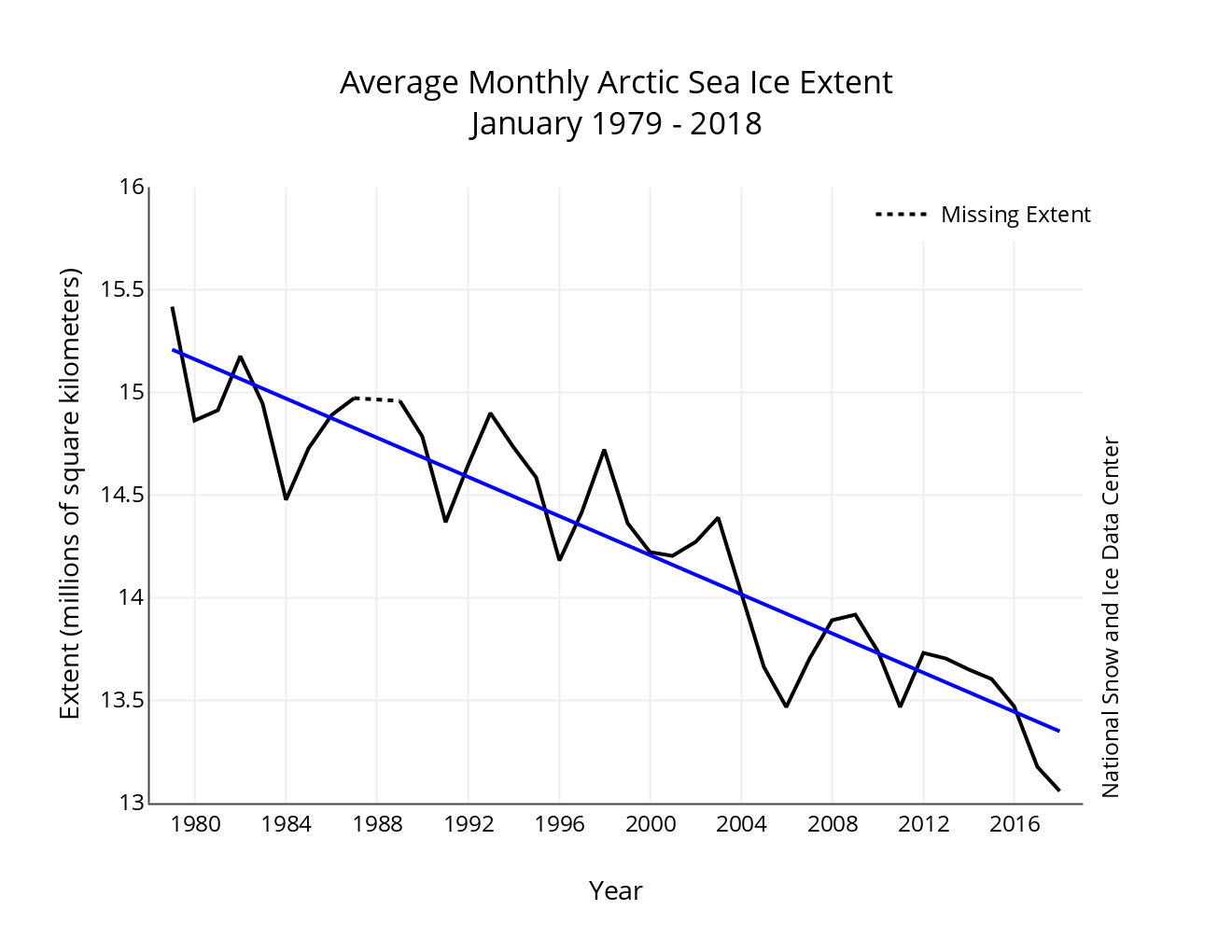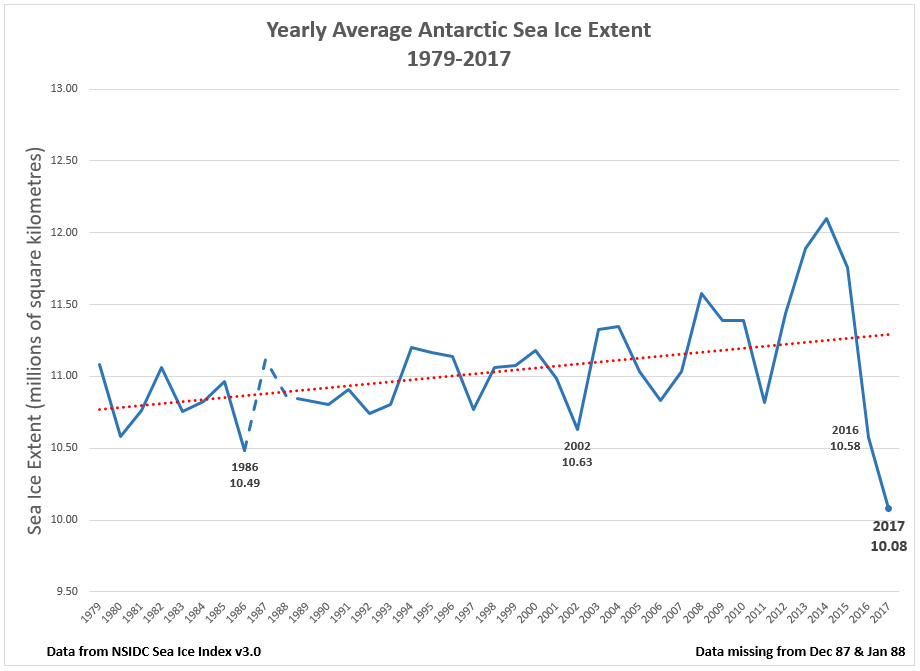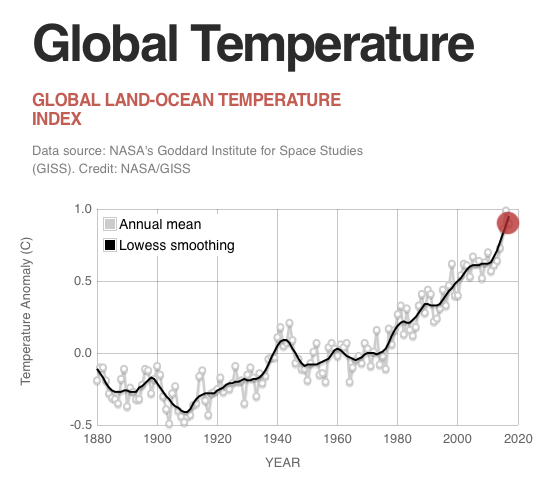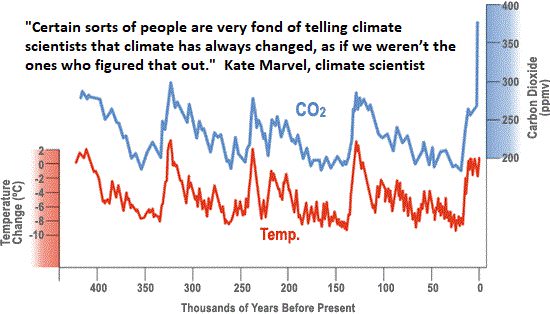You are using an out of date browser. It may not display this or other websites correctly.
You should upgrade or use an alternative browser.
You should upgrade or use an alternative browser.
So that's the climate f****d then
- Thread starter avole
- Start date
kendo
Prussian bot
Oops, Not only the wrong topic but the wrong forum!kendo,
Holy segue, batman!
Joe
jackbarron
Chelsea, London
Jack,
The main causes of extinction? It depends on the species in question, but as a rule, the causes of extinction, from highest to lowest, are habitat destruction, invasive species, pollution, human over-population, and over-harvesting by hunting and fishing. (Conservation biologists came up with an acronym to make it easier to remember — HIPPO: Habitat loss, invasive species, pollution, human population, and over-harvesting.)
Joe
Joe,
Blimey, HIPPO and climate change are powerful destructive forces. Is there any good news?
Jack
Joe P
Memory Alpha incarnate | mod; Shatner number = 2
Jack,
Well, this ain't good news.

A four decade downward trend in Arctic sea ice with a new record low.

And at the other pole, despite a small increase in Antarctica sea ice over the past four decades, it's now at a record low.
Somehow I doubt this is the record Trump was talking about.
Joe
Well, this ain't good news.

A four decade downward trend in Arctic sea ice with a new record low.

And at the other pole, despite a small increase in Antarctica sea ice over the past four decades, it's now at a record low.
Somehow I doubt this is the record Trump was talking about.
Joe
Rockmeister
pfm Member
Jack,
Well, this ain't good news.

A four decade downward trend in Arctic sea ice with a new record low.

And at the other pole, despite a small increase in Antarctica sea ice over the past four decades, it's now at a record low.
Somehow I doubt this is the record Trump was talking about.
Joe
Those two charts could start a new panic...earth axis shift revealed?!
jackbarron
Chelsea, London
Jack,
Well, this ain't good news.

A four decade downward trend in Arctic sea ice with a new record low.

And at the other pole, despite a small increase in Antarctica sea ice over the past four decades, it's now at a record low.
Somehow I doubt this is the record Trump was talking about.
Joe
Blimey yeah Joe. If I understand it right, 2 1/2 million square kilometres of Arctic, and 1 million of Antarctic, sea ice have gone. Things aren't looking good.
Jack
Rockmeister
pfm Member
Odd then that we, in geological terms are actually IN a glacial period right now anyway, and in the long term (maybe the next 50-100 million years) we would expect to see things warming up (a LOT) regardless. Within that large pattern, there are much smaller peaks and troughs...I think I remember that 100,000 years odd see's enough fluctuation to either melt artic ice totally, or bring the ice sheet down to somewhere around central france...Of course we human ants have introduced a bit of a poisonous blip with toxic gases, but I doubt history will record this minute deviation, since once out of the ice age, we will, here in europe, be getting abbout 5-10c more...in an ice age proper, european temps would average about 15c less. Our predicted interference change of 1-3c depending on who you read is a lot for US, but not really going to be remembered by our G G G G G G G G G G G grandchildren. (from Mars).
Joe P
Memory Alpha incarnate | mod; Shatner number = 2
Rock,
We are most definitely not in a glacial period right now. The most recent glacial period ended about 15,000 years ago, give or take.
I remember it well — they were good times. Back then you could walk from Russia to the New World across the Bering Straight to drive the mammoths and mastodons to extinction.
Joe
We are most definitely not in a glacial period right now. The most recent glacial period ended about 15,000 years ago, give or take.
I remember it well — they were good times. Back then you could walk from Russia to the New World across the Bering Straight to drive the mammoths and mastodons to extinction.
Joe
Rockmeister
pfm Member
I expressed it badly. in the longer term, (100's of millions of years) the planet's temp has fluctuated very severely, by swings of approx 20c or more...checking the fossil records back to the Cambrian (500 mill odd) shows about 3 peaks and 4 troughs since then. In broad terms, the last 250,000 has been part of one of those troughs. What we now call 'ice ages' are much shorter term changes, lasting maybe 100,000 years each, within that trough, so although this is a warming peak right now, it's a little peak near the bottom of the current 100million year trough. We can and probably will, get MUCH MUCH warmer than this, in time.
I think. It was only A level geology and wikipedia! If you have a doctorate I'm out
I think. It was only A level geology and wikipedia! If you have a doctorate I'm out
Joe P
Memory Alpha incarnate | mod; Shatner number = 2
Rock,
The issue is that the planet is heating up right now, the rate of change is unprecedented since humans have walked the Earth, and we're the cause of the change.

What happened on Earth 500 million years ago is of course fascinating, but it's of little relevance to a biological world that has moved on a bit from the time that simple invertebrates teemed in the oceans. I mean, 500 million years ago is before the time when the earliest vertebrates appeared. It's even before the time when simple plants colonized land.
Joe
The issue is that the planet is heating up right now, the rate of change is unprecedented since humans have walked the Earth, and we're the cause of the change.

What happened on Earth 500 million years ago is of course fascinating, but it's of little relevance to a biological world that has moved on a bit from the time that simple invertebrates teemed in the oceans. I mean, 500 million years ago is before the time when the earliest vertebrates appeared. It's even before the time when simple plants colonized land.
Joe
Rockmeister
pfm Member
Oh no...cambrian fossils abound, but anyway, yes of course, for US this matters as I said...the earth however will survive and regenerate on it's own timescale.
This is certainly our problem, and we being responsible should fix it, and now, I agree.
This is certainly our problem, and we being responsible should fix it, and now, I agree.
Joe P
Memory Alpha incarnate | mod; Shatner number = 2
Rock,
https://www.cnn.com/2016/10/26/world/wild-animals-disappear-report-wwf/index.html
Joe
Of course the Earth will survive. Mercury and Venus are proof that a planet can be extremely hot — in Venus's case, its surface is hot enough for lead to melt — and yet the planet will continue to be. But this isn't the point. It's like saying a spaceship without air would continue to exist. True, but it would suck if you were thinking on being onboard, given your need for oxygen.the earth however will survive
It won't if we continue to destroy habitat, introduce invasive species, pollute, over fish, over hunt, etc. The shocking decline in biodiversity is all the evidence you need to see that life is not regenerating.regenerate on it's own timescale
https://www.cnn.com/2016/10/26/world/wild-animals-disappear-report-wwf/index.html
Joe
Rockmeister
pfm Member
well in essence we agree about the short term, as I said, but you're not talking about the long term, you want the planet to exist as it is now (or maybe as it was 500 years ago, in bio terms?)Rock,
Of course the Earth will survive. Mercury and Venus are proof that a planet can be extremely hot — in Venus's case, its surface is hot enough for lead to melt — and yet the planet will continue to be. But this isn't the point. It's like saying a spaceship without air would continue to exist. True, but it would suck if you were thinking on being onboard, given your need for oxygen.
It won't if we continue to destroy habitat, introduce invasive species, pollute, over fish, over hunt, etc. The shocking decline in biodiversity is all the evidence you need to see that life is not regenerating.
https://www.cnn.com/2016/10/26/world/wild-animals-disappear-report-wwf/index.html
Joe
We may be able to engineer that, although I think we reached tipping point about 60 years ago with the unchecked emissions problems, in search of wealth regardless. Shamefully short sighted but maybe understandable. No, my view is how species will change and evolve much much later. Solar system timescale does not notice 'us'. We are a dot (quite a destructive and annoying dot to boot). Earth will develop new life forms that can adapt to a more poisoned (in our terms) atmosphere. It will.
Go look at a piece of land that was once a building and is now discarded. Photos of the Chernoble site are good for thius. See how Nature regenerates. Now imagine that same photo in 1 million years time?And again, without man, in 50 million.
Joe P
Memory Alpha incarnate | mod; Shatner number = 2
Rock,
Two issues are being conflated here — is nature resilient and is extinction final?
Yes, nature is incredibly resilient. It bounces back after incredible assaults, like your Chernobyl example, or after, say, a major volcanic eruption. This type of natural regeneration can happen quickly — in years, decades or centuries — assuming the area is left to recover. It typically starts with early colonizers, that change the soil that allows other organisms to become established, which allow... It's not instant and it occurs in phases, but life does recover.
The second issue is extinction — the extermination of a lineage, race or species. We are undoubtedly reducing biodiversity globally. A century ago tigers numbered in the hundreds of thousands, but today the worldwide population is around 3,900. We've done the same to African elephants, lions, many primate species, frogs worldwide,...
Once a species' number drops to a certain level, recovery is difficult if not impossible. This is what I'm concerned about. Species disappear forever.
At a grand view, biodiversity does recover even after mass extinctions, but the time scales involved are measured in millions of years (not a human lifetime or two) and the recovery occurs without further setbacks. Image if after the comet or meteor that caused the Cretaceous mass extinction 65 million years ago the Earth had been continuously bombarded from space every ten years or so by another comet or meteor. That's the analogy — admittedly, an imperfect one — to what's occurring right now. Major assault > minor recovery > another major assault.
We're heading towards a biologically impoverished world. Maybe we'll avoid the worst of it, but I doubt that. Tiny bits of progress are offset by giant steps backwards.
Since we're all music heads here, the way to think about extinction of a species is to view it as though all traces of Beethoven's ninth were burned. At a grander scale, it's like wiping out all traces of Beethoven -- everything he ever composed. And given what we're actually doing, it's like expunging all traces of the romantic period.
Joe
Two issues are being conflated here — is nature resilient and is extinction final?
Yes, nature is incredibly resilient. It bounces back after incredible assaults, like your Chernobyl example, or after, say, a major volcanic eruption. This type of natural regeneration can happen quickly — in years, decades or centuries — assuming the area is left to recover. It typically starts with early colonizers, that change the soil that allows other organisms to become established, which allow... It's not instant and it occurs in phases, but life does recover.
The second issue is extinction — the extermination of a lineage, race or species. We are undoubtedly reducing biodiversity globally. A century ago tigers numbered in the hundreds of thousands, but today the worldwide population is around 3,900. We've done the same to African elephants, lions, many primate species, frogs worldwide,...
Once a species' number drops to a certain level, recovery is difficult if not impossible. This is what I'm concerned about. Species disappear forever.
At a grand view, biodiversity does recover even after mass extinctions, but the time scales involved are measured in millions of years (not a human lifetime or two) and the recovery occurs without further setbacks. Image if after the comet or meteor that caused the Cretaceous mass extinction 65 million years ago the Earth had been continuously bombarded from space every ten years or so by another comet or meteor. That's the analogy — admittedly, an imperfect one — to what's occurring right now. Major assault > minor recovery > another major assault.
We're heading towards a biologically impoverished world. Maybe we'll avoid the worst of it, but I doubt that. Tiny bits of progress are offset by giant steps backwards.
Since we're all music heads here, the way to think about extinction of a species is to view it as though all traces of Beethoven's ninth were burned. At a grander scale, it's like wiping out all traces of Beethoven -- everything he ever composed. And given what we're actually doing, it's like expunging all traces of the romantic period.
Joe
vuk
\o/ choose anarchy
but I doubt history will record this minute deviation
since we are the ones recording history, i'm quite sure this will all be very well documented, especially when the chaos gets into full swing and we all eventually die from it.


